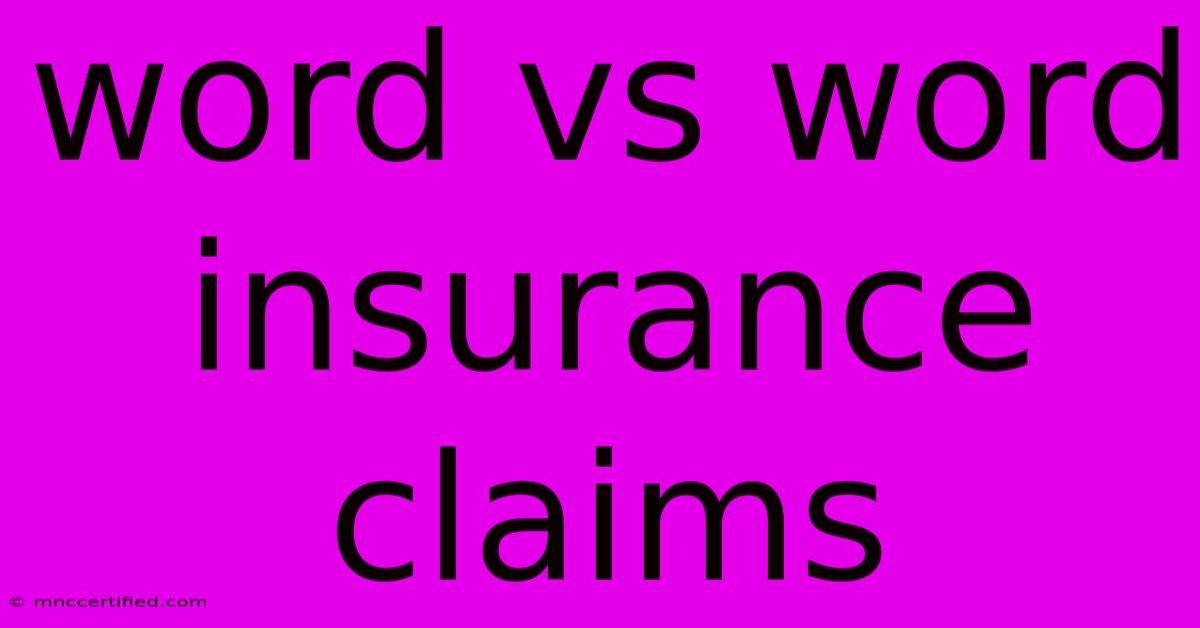Word Vs Word Insurance Claims

Table of Contents
Word vs. Word Insurance Claims: Navigating Disputes and Seeking Fair Settlements
Insurance claims can be stressful, but when the claim hinges on a "he said, she said" scenario – a word-against-word dispute – the process becomes significantly more challenging. This article explores the complexities of word vs. word insurance claims, offering strategies for navigating these situations and maximizing your chances of a fair settlement.
Understanding Word vs. Word Claims
A word vs. word insurance claim arises when there are conflicting accounts of an incident with no independent corroborating evidence. This lack of physical evidence, witness testimonies, or documented proof makes determining fault incredibly difficult. Examples include:
- Car accidents: Two drivers disagree on who caused the collision, with no CCTV footage or witnesses.
- Property damage: Landlords and tenants disagree over the cause of damage, lacking photographic or documented proof.
- Personal injury: Disputes arise regarding the cause or extent of injuries, with no medical reports supporting the claim.
These situations often leave insurance companies hesitant to pay out, leading to lengthy investigations and potentially unfair outcomes.
The Challenges of Proving Your Case
The biggest challenge in a word vs. word claim is establishing credibility. Without objective evidence, your word becomes your primary weapon. To strengthen your position, consider the following:
- Detailed Documentation: Maintain meticulous records. This includes photos, videos, emails, text messages, and any other relevant communication. Even seemingly insignificant details can be crucial.
- Consistent Narrative: Ensure your account of events remains consistent across all communication. Any discrepancies can weaken your credibility.
- Witness Testimony (If Available): If anyone witnessed the incident, obtain their contact information and written statements immediately. Their independent accounts can significantly bolster your claim.
- Prompt Reporting: Report the incident to your insurance company as soon as possible. Delays can be interpreted negatively.
- Professional Assistance: Consider consulting with a personal injury lawyer or insurance claims specialist. They possess the expertise to navigate the legal intricacies and advocate on your behalf.
Strategies for a Successful Outcome
Even with limited evidence, you can increase your chances of a favorable settlement. These strategies can help:
1. Build a Strong Case
Focus on presenting a clear, concise, and compelling narrative. Highlight inconsistencies in the other party's account and emphasize any evidence – even circumstantial – that supports your version of events.
2. Negotiate Effectively
Be prepared to negotiate. Insurance adjusters often attempt to settle claims for less than their actual value. Understanding your rights and having a clear understanding of your losses will help you negotiate a fair settlement.
3. Document Everything
Meticulously document every interaction with the insurance company, including dates, times, names of representatives, and the substance of conversations. This documentation will be invaluable if the claim proceeds to litigation.
4. Consider Mediation or Arbitration
If negotiations fail, consider mediation or arbitration. These alternative dispute resolution methods can provide a more informal and cost-effective way to resolve the dispute than going to court.
5. Legal Representation
In complex or high-value claims, legal representation is often advisable. A lawyer can help you gather evidence, negotiate with the insurance company, and, if necessary, represent you in court.
Keywords for SEO:
- word vs word insurance claim
- he said she said insurance claim
- insurance claim dispute
- no evidence insurance claim
- proving your case insurance claim
- insurance claim negotiation
- alternative dispute resolution insurance
- insurance claim lawyer
- word of mouth insurance claim
- conflicting accounts insurance claim
This article provides a comprehensive overview of navigating word vs. word insurance claims, highlighting the challenges and offering practical strategies for achieving a fair outcome. Remember, proactive documentation and seeking professional help are crucial for maximizing your chances of success.

Thank you for visiting our website wich cover about Word Vs Word Insurance Claims. We hope the information provided has been useful to you. Feel free to contact us if you have any questions or need further assistance. See you next time and dont miss to bookmark.
Featured Posts
-
Auto Detailing Insurance Cost
Nov 29, 2024
-
Confirmed Chelsea Vs Heidenheim Xi
Nov 29, 2024
-
21 Detained At Rainy Parade
Nov 29, 2024
-
Burial Insurance In Louisiana
Nov 29, 2024
-
Slater Familys Donation Journey Ends
Nov 29, 2024